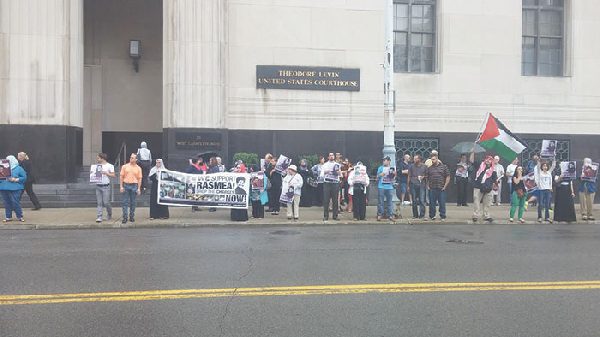
|
| Rasmea Odeh supporters demonstrate in front of the federal courthouse in Detroit on Sept. 2. |
DETROIT — A new trial date was set for Palestinian activist Rasmea Odeh, who is accused of lying on her citizenship application in 2004 about a conviction in an Israeli military prison decades ago.
On Tuesday, Sept. 2, Odeh’s supporters gathered for the fourth time in front of the Theodore Levin U.S. Courthouse in Detroit, demanding that the prosecution drop the charges.
In the first court session since he took over the case, U.S. District Judge Gershwin A. Drain set the trial for Nov. 4 in his chamber, without allowing the protesters to enter the room. Drain was handed the case last month after Judge Paul Borman recused himself because of his family’s financial ties to an Israeli supermarket that Odeh was convicted of bombing in 1969.
Michael Deutsch, Odeh’s lead attorney, said it was disappointing that Drain did not get to see the defendant’s supporters in the courtroom; but added that the judge was not hostile and affirmed that he always sets trial dates in closed sessions.
Odeh, 67, was found guilty of “membership of an illegal organization” in Israel in 1970. She was convicted for being a member of the Popular Front of Liberation of Palestine (PFLP) and participating in three bombings claimed by the organization.
Odeh spent 10 years in Israeli prisons before being released in a prisoner-exchange deal between Israel and the PFLP.
She immigrated to the United States 20 years ago and has been living in Chicago, where she became a known advocate for immigrant and women’s rights issues. Federal officers arrested her at her Chicago home last Oct. 22.
Judge Drain assigned Oct. 2 and Oct. 21 to discuss and rule on motions. The defense has filed several motions, one of which demands dropping the charges because the indictment against Odeh was sparked by an “unconstitutional” investigation of fellow anti-war activists in Chicago.
In 2010, the FBI raided the homes of 23 political activists, including Hatem Abudayyeh, the executive director of the Arab American Action Network, where Odeh works. The activists were ordered to appear in front of a grand jury. Nobody was indicted.
Abudayyeh said federal agencies “discovered” Odeh through their illegal, politically motivated investigation of the activists, describing Odeh’s indictment as “the fruit of the forbidden tree.”
Defense attorneys are also requesting that the State Department release documents relating to Odeh from the time of her arrest.
Deutsch said Odeh was nabbed by the Israelis in 1969 in a crackdown that led to the arrest of 500 Palestinians.
The U.S. embassy and consulate in Israel interviewed arrested Palestinian Americans, including Odeh’s father, Yousef. Interviewees whose arrest were political in nature were exempted from any charges in the United States, according to Deutsch.
The motion states that the defense believes the documents would prove that the U.S. State Department know that Odeh and her father were tortured by the Israeli military.
According to the motion, the documents would also show that the U.S. government had knowledge of Odeh’s arrest, conviction and imprisonment and “therefore her responses to those questions on her visa and naturalization application were not material since the government already knew the answers [to them] and did not raise them as a bar to her entering the country, obtaining permanent residency status or citizenship.”
“Intimidation tactic.”
“Hey McQuade let’s be clear, Rasmea is welcomed here,” the protesters chanted in front of the courthouse, addressing Barbara McQuade, the U.S. Attorney for the Eastern District of Michigan.
A verbal altercation ensued between the protesters and the Department of Homeland Security Police, when officers ordered the protesters to stop chanting with a megaphone in front of the courthouse. Abuddayyeh asked a court official to produce the statute that bans using megaphones in front of the courthouse.
The official promised to produce the documents, but she never did. Meanwhile, an officer threatened to arrest the protesters if they do not stop chanting with the sound amplifier.
“You’re about to be arrested. you have to get across the street,” the officer signaled to the demonstrator with the megaphone.
When Abudayyeh tried to reason with him, the officer said: “I don’t want to talk about it, son. Across the street. I don’t want to talk about it.”
“There is no reason for you to be talking to us that way,” Abudayyeh replied.
Eventually, chants on the megaphone were shouted from across the building, where they were still audible. The crowd repeated the chants in front of the courthouse.
Muhamad Sankari, the Chicago-based activist who was chanting on the megaphone, described the police’s approach as an “intimidation tactic.”
“They were basically saying, ‘You can’t chant here because we told you so,'” Sankari said of the police. “It is a clear abuse of power.”
Abudayyeh said the encounter with the police “proved that they are bullies,” adding that the officer’s tone was disrespectful.
“We don’t have problem dealing with the police. We do it at every protest,” Abudayyeh said. “The problem is when they come at us with disrespect and raise their voices. That’s why I snapped back at them. If they tell us we can’t chant here, they have to show a statute in writing. We have First Amendment rights and we did not violate any laws.”
Abudayyeh echoed Sankari’s comments that the police’s attitude was an attempt to intimidate the protesters. “We used the microphone in the past four times, and now they tell us we can’t have sound,” said Abudayyeh. “Whoever wanted to act stronger than us and holier than us had no right to do so.”
As the crowd was leaving the courthouse, the court official who promised to produce the law banning megaphones told the demonstrators they were “lying” because sound amplifiers were not used in front of the court in past demonstrations. However, The Arab American News can confirm that the protesters did use a megaphone on previous occasions.






Leave a Reply